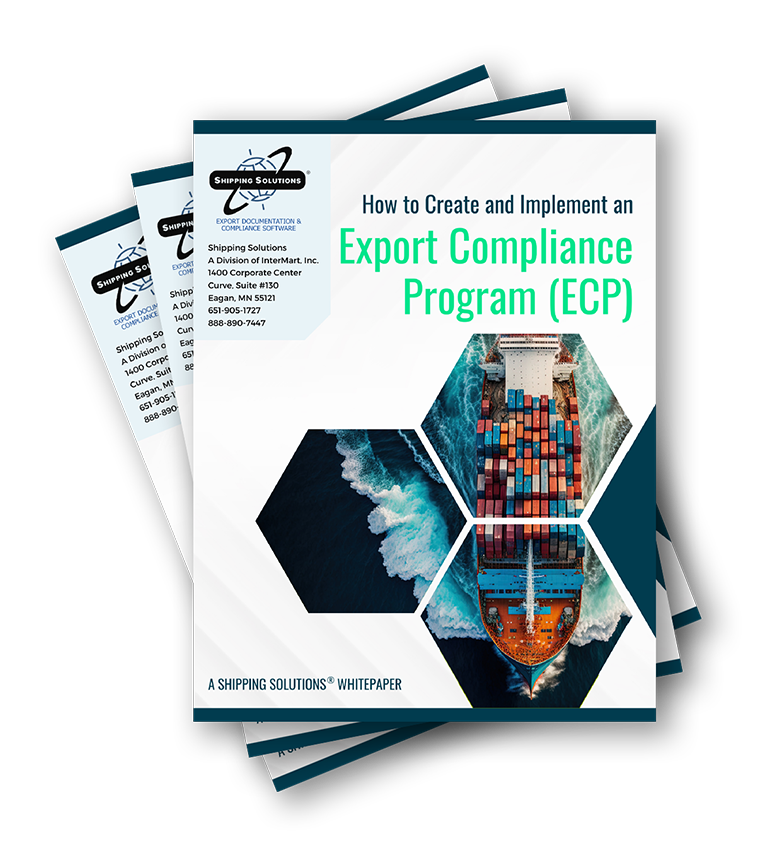The International Trade Blog Export Compliance
Export Documentation Requirements: Who Should Sign Your Documents
On: May 9, 2018 | By:  David Noah |
6 min. read
David Noah |
6 min. read
 “Can anyone at my company sign export documents?”
“Can anyone at my company sign export documents?”
I get this question quite often—along with its cousins, “What does it mean when I sign an export document?” and “Am I putting myself at risk when I sign export documents?”
These are important questions without a uniform answer. As a general rule, I tell exporters that anyone can sign who can attest to the accuracy of the documents. So what does that mean, exactly?
Like many things in exporting, there’s not one single right answer—just guidelines and best practices. So the best reply to these questions is this: Review each specific situation individually to make sure you’re doing the right thing in every single shipment.
Who Should Sign Your Export Documentation
The person or persons who sign your export documents (a role sometimes called “signature authority”) should have the following characteristics:
- Authority in the company. Authority is particularly important when dealing with Free Trade Agreement certificate of origin, because the signature on the document represents a claim that your goods qualify for preferential treatment. If you don’t have the authority to make the claim about preferential treatment, don’t sign the document.
- Consistency. If possible, the person who signs export documents should be the same for every shipment.
- Accepting of liability. The person who signs your export documents is making themselves legally liable for export compliance. It’s dangerous and irresponsible to assign this responsibility randomly—say, to someone in the shipping department—because “no one else is there to do it.”
- Knows the documents. The person who signs your documents should understand exactly what they’re signing and be very familiar with each form.
- Knows export regulations. Similarly, the signer should also thoroughly understand export regulations—and the consequences of violating them.

Most of the regulations related to exporting don't define a specific type of person who must sign the export regulations. But they are clear that whomever signs the documents can be held personally liable for the accuracy of the information.
For example, when a new person sets up a user account to be able to file their Electronic Export Information through AESDirect on the Automated Commercial Environment (ACE) portal, they must agree to several statements including:
I understand that civil and criminal penalties, including forfeiture and sale, may be imposed for making false or fraudulent statements herein, failing to provide the requested information, or for violation of U.S. laws on exportation (13 U.S.C. Sec. 305; 22 U.S.C. Sec 401; 18 U.S.C. Sec. 1001; 50 U.S.C. App. 2410).
International Traffic in Arms Regulations
The exception to this ambiguity is found in the International Traffic in Arms Regulations (ITAR). Pursuant to the ITAR, the person who should sign documents should be an empowered official. An empowered official is explained as follows:
An empowered official is authorized by a business enterprise to sign and process license applications on behalf of the company. An empowered official understands the provisions of ITAR. This individual has the authority within his/her company to inquire into any aspect of a proposed export and to verify the legality and accuracy of the information submitted for a transaction. An empowered official also has the authority to refuse to sign any license application without retribution from his/her company. This is important because an empowered official is held liable for any violations of ITAR.
Being an Empowered Official (EO) is not a “paper-pushing,” administrative job, but a position which requires detailed substantive knowledge of the International Traffic in Arms Regulations and the Arms Export Control Act. The position carries within it liability for both the company and the individual—a liability which emphasizes the need for an experienced, well-trained and competent Official.
The federal regulations definition an empowered official is as follows:
120.25 Empowered Official:
(a) Empowered Official means a U.S. person who:
(1) Is directly employed by the applicant or a subsidiary in a position having authority for policy or management within the applicant organization; and
(2) Is legally empowered in writing by the applicant to sign license applications or other requests for approval on behalf of the applicant; and
(3) Understands the provisions and requirements of the various export control statutes and regulations, and the criminal liability, civil liability and administrative penalties for violating the Arms Export Control Act and the International Traffic in Arms Regulations; and
(4) Has the independent authority to:
(i) Inquire into any aspect of a proposed export, temporary import, or brokering activity by the applicant;
(ii) Verify the legality of the transaction and the accuracy of the information to be submitted; and
(iii) Refuse to sign any license application or other request for approval without prejudice or other adverse recourse.
(b) For the purposes of a broker who is a foreign person, the empowered official may be a foreign person who otherwise meets the criteria for an empowered official in paragraph (a) of this section.
Based on these definitions, I like what Chuck Hough says in his blog about the importance of companies designating an Empowered Official:
When a person signs a license application, a certification letter, or other request for approval as an empowered official, it includes a certification that he/she is empowered by the applicant. If a person signs the application without meeting any part of the “empowered official” definition, he/she could be charged with making a false statement.
In addition, the EO is certifying that neither the company, none of the company’s senior officials, nor members of the board of directors has been indicted or convicted of violating any of the criminal statutes enumerated in section 120.27 of the ITAR. How many people know what these statutes are and if any company officials have been indicted or convicted under any of them? As we have been seeing more instances of corporate malfeasance recently, this has become an increasingly important question.
Requiring Written Company Procedures
Regardless of which sets of regulations guide their exports, companies that export should have a written Export Management and Compliance Program (EMCP) in place that defines all aspects of their export procedures including the duties and responsibilities of all employees who are part of the export process. Not only does this help ensure that companies are doing their due diligence, which is a mitigating factor against penalties, it helps protect the individuals signing the documents.
Without some sort of written guidance from their companies, employees who sign the export paperwork are putting themselves at risk. Make no mistake, there are too many companies that are willing to hang the yoke of non-compliance around the neck of an individual if it means they avoid the negative impact of export violations.
Before you accept the responsibility of signing export paperwork, make sure your company procedures are in writing, and you have written acknowledgement that you have the authority to sign. If that's not the case, don't do it!
Conclusion
I’d love to be able to tell you exactly who can sign every document you’ll ever encounter in your exporting journey. Unfortunately, that’s just not possible. Different companies have different titles for who can sign what, rules vary, and different parts of the government have different requirements for signers, too.
However, the practical advice I can give you is as follows:
- Do your research. Make sure the person you have signing meets all five of the suggested requirements bulleted in the first part of this article.
- If you have questions, consult your legal counsel or legal department at your company.
- Once you have identified who should sign your documents, you need to make it a policy and incorporate it into your company’s EMCP.
- Make sure you follow your plan for every shipment. Shipping Solutions will help you do that by tracking each export and noting that you’ve followed your plan in the shipment log. Click here to see a free online demo of how the software helps you stay compliant.
Like what you read? Subscribe today to the International Trade Blog to get the latest news and tips for exporters and importers delivered to your inbox.

About the Author: David Noah
As president of Shipping Solutions, I've helped thousands of exporters more efficiently create accurate export documents and stay compliant with import-export regulations. Our Shipping Solutions software eliminates redundant data entry, which allows you to create your export paperwork up to five-times faster than using templates and reduces the chances of making the types of errors that could slow down your shipments and make it more difficult to get paid. I frequently write and speak on export documentation, regulations and compliance issues.

